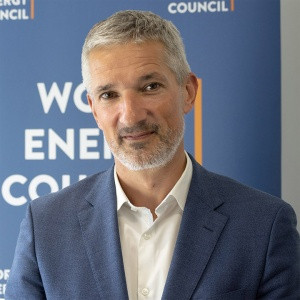Energy innovation is our biggest hope in fight against climate change – WEC
Clean Energy Wire: How important are start-ups for the energy transition? How would you define their role?
Christoph Frei: First, we need to look at the whole innovation context. At the World Energy Council, we have a mission of sustainable energy and we define it using the trilemma and balance between security, environment, and affordability. But we fail on all three criteria at the moment. We still have a billion people without energy access on the planet, and we are not on a promising track regarding the fight against climate change, according to the most probable scenarios.
All this is a massive call for the transition and innovation agenda. You have incumbent innovation and start-up innovation. We do believe that we need to think out of the box today. There is a lot of great stuff happening at the moment on the incumbent side. But we also need to challenge conventional paradigms, and we need to find those ideas. And that’s exactly what the start-ups are about. They deliver this kind of ‘out-of-the-box’ thinking and the necessary attitude. They have no fear of reinventing everything, and I think it’s very healthy to bring that to the table, and challenge the conventional wisdom.
How would you disentangle the impact of innovation and policy on the energy transition? What is more important for its success?
You need both, and the World Energy Council is pursuing both. Without the right policy we will not get there. For example, the WEC is in favour of a strong carbon price, and trade is also absolutely critical if you want to bring down learning curves in technology. But currently, trade and politics are not that simple. But we observe that innovation speed has exceeded our imagination, and that is probably the biggest source of hope. There is so much good stuff happening, and that has surprised us so many times.
Would you say that start-ups’ most important role is to market their own innovations, or to trigger incumbent innovation?
This is not about replacing all of the old with the new. For example, just think about urbanisation. It means new megacities, which are massive consumption centres. There is no way you feed those without backbone infrastructure. The question is not: “Can we replace those incumbent backbones?” Instead, we should ask: ‘How do we help those incumbent backbones to get more creative about sector coupling, power-to-x, modern forms of mobility, and so on. So it’s not A versus B, it’s about inspiring those who have big assets today, and help them manage those assets more effectively.
What sort of environment do start-ups need to prosper? How can we encourage their innovative potential?
I think we’re talking about innovation ecosystem creation here. A lot of countries are currently trying to understand how to build those innovation ecosystems. We must all learn from the best practice examples.
First of all, it’s about education. But you also have to make sure to have accelerators or incubators that help initiate the process. It’s also about making sure that you have the right incentives and capital support mechanisms in place. Additionally, you need the necessary networks to deliver pilot projects, follow-up projects and taking things to scale.
What are the most important trends regarding energy transition start-ups today?
The WEC has monitored innovation trends for ten years. In a very simplified version you can say that the three D’s have come from nowhere to absolutely front and centre: Decarbonisation, decentralisation, and digitalisation. Underneath that, you have a whole series of issues, but it really comes down to the fact that these three trends were of no interest to a typical energy decision maker even five or ten years ago. Today, it’s a must – You will not get a job if you don’t master those terms, and don’t know how to implement them.
Were start-ups instrumental in establishing those trends?
The interesting thing is: We did an issue survey with the start-ups and the incumbents, and they looked 90 percent the same. But there were two differences: One is about commodity prices, and one about digitalisation. In the start-up world, commodity prices are generally not seen as relevant. Most start-ups live in a world beyond commodities. In contrast, the incumbents are very concerned about commodity price volatility and so on.
The other difference concerns digitalisation. For the incumbents, it’s very important, but also relatively uncertain. They ask themselves: “What the hell are we going to do with it? How do we approach this? What are the priorities? What are the regulatory constraints?”
The situation is very different for the innovators. They are at home in that world. For them, the topic has an absolutely low uncertainty. I would say that digitalisation really is one of the key drivers of innovation, and it’s the space where start-ups make their living.
What’s Germany’s status in this landscape? Is there anything special about the original energy transition pioneer?
Germany is one of the world’s largest economies, for a start. It’s got a very strong tech and education base. Berlin itself has become an innovation hub. There are probably a handful of innovation hubs world-wide, and Berlin is clearly seen as one of them. So Germany has a key role to play, and it’s a great place to be for start-ups.
The mere fact that the term “Energiewende” has become a globalised word also speaks for itself. The entire concept has a “copyright in Germany” stamp on it, so to speak. The inspiration is still there. If people want to understand what an energy transition could possibly mean, they still look to Germany for what could go wrong, and also for what could go right. Germany has to offer examples for both. There is still a lot to learn from Germany, and people are very interested to see Germany’s experience.


